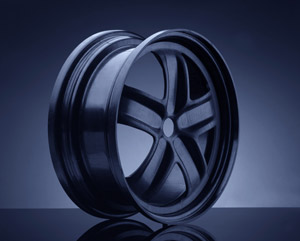TENCATE
Cooperation with Swiss Kringlan Composites for automotive industry / Development near an end
Composites specialist TenCate Advanced Composites (www.tencateadvancedcomposites.com), one of the primary business sectors of Dutch Royal TenCate (Nijverdal; www.tencate.com), and Kringlan Composites (Otelfingen, Switzerland; www.kringlan.ch) have recently signed a memorandum of understanding (MoU) to develop solutions for parts manufacturing using thermoplastic composite technology. The most recent development initiated by the Swiss composites specialist has been the design and production of a full carbon fibre-reinforced composite wheel for high-performance cars. Meanwhile, the high- performance prepreg supplier from Nijverdal has been involved in developing the thermoplastic composite material. Development is now in its final stage with series production soon to begin.
 MK-1 prototype wheel picture (Photo: Kringlan Composites) |
Both companies stated that close cooperations between material companies and a parts manufacturers is necessary to implement fibre-reinforced thermoplastics technology for the automotive industry. TenCate brought its 25 years thermoplastics experience from the aerospace industry into the cooperation along with its portfolio of "TenCate Cetex" materials, which it hopes to expand into the automotive sector.
The focus of the cooperation is on high-performance parts, such as composite wheels, which enhance safety and reduce weight. Acceleration of lightweight wheels translates into reduced energy consumption and lower CO2 emission from a vehicle. The weight reduction per wheel ranges from 30-40%, according to TenCate. The use of thermoplastic composite allows for series production due to a much shorter production time.
Not long ago, Kringlan Composites, a spin-off of the Swiss Federal Institute of Technology (ETH) in Zürich, came up with a patented technology which can be used in the series production of composite wheels.
The focus of the cooperation is on high-performance parts, such as composite wheels, which enhance safety and reduce weight. Acceleration of lightweight wheels translates into reduced energy consumption and lower CO2 emission from a vehicle. The weight reduction per wheel ranges from 30-40%, according to TenCate. The use of thermoplastic composite allows for series production due to a much shorter production time.
Not long ago, Kringlan Composites, a spin-off of the Swiss Federal Institute of Technology (ETH) in Zürich, came up with a patented technology which can be used in the series production of composite wheels.
18.09.2013 Plasteurope.com [226365-0]
Published on 18.09.2013

 German version of this article...
German version of this article...